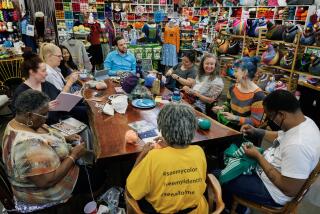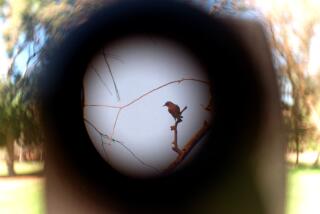Review: Fighting late capitalism, one chicken at a time
- Share via
Did you know that chickens left to roam free organize themselves into complex cliques? That they can vocalize in 30 different ways? That each day, hens call to the chicks harbored within the shells upon which they brood and that the fluffy little fetuses inside click back with their uncalcified beaks?
Like so many kernels of feed, these insights into chicken civilization are scattered throughout Deb Olin Unferth’s kaleidoscopic sixth book, “Barn 8.” Set in rural Iowa, where Big Ag is king and residents still rely on the TV Guide in print, the novel tells the story of an uprising against the system, organized from within, carried out by the misfits for whom that system was never quite calibrated.
More specifically, “Barn 8” begins with Janey, a young woman who flees New York for Iowa to meet the father she’s just discovered exists, a cardboard cutout of a man who eats takeout from IHOP for every meal and watches endless hours of sports on a vinyl sofa. Through a series of tragic events, Janey gets stuck in Iowa and, over the next decade, drifts further afield from the “old Janey” — ambitious, bright-eyed, going places — until she lands a job as an auditor for the U.S. egg industry. Charged with tromping through the ammonia-stinking horrors of the industrial fowl complex and evaluating the minutiae of its cage infrastructure and sanitary protocols, Janey joins her auditing mentor, Cleveland, in the secret, highly illegal practice of stealing the odd hen and delivering it to a local animal rights outpost. Together, they come up with a grand plan to free nearly a million chickens from a factory farm.
Cleveland’s boss likens the miracle of a dozen eggs to the American Dream — the protein- and vitamin B-12-packed measure of a successful democracy. But if the egg symbolizes the health and prosperity of a civilization, what does it say about that civilization’s moral fiber when its production has been shunted off to the fringes of America’s consciousness? In one of Unferth’s omniscient, sweeping surveys of the industry’s technologically souped-up mechanics, its dystopia of automation, she pinpoints the irony of nature enchained:
“Inside: Barn universe. Completely enclosed in steel and concrete, seven tremendous aisles of cages soaring twenty-five feet high, eight tiers in two stories. A system of chains bringing in the feed, a series of belts carrying out the excrement … On a wide conveyor, eggs slowly floated by.”
Unferth’s lens, which telescopes through time and space, is unafraid to linger on the bizarre and vicious cycle of birth-death, need-fulfillment and supply-demand that this phantom-run barn universe perpetuates. The architecture of this very real industry (which could stand as metaphor for any of the behemoth industries that seem to stork-drop products and services on demand) is sickening and overwhelming, yet Unferth never traffics in gratuitous shock. Instead, her sentences and constantly shifting point of view are embroidered with a great deal of unexpected tenderness and optimism. (“We were going to have to hope that the primitive gene was strong, stronger than humans, that the hen would sit … nurture, tend, protect [stay no matter what].”) And she always returns to the notion that if we are willing to strip back the layers, see beyond progress’ forward march, we may be able to return to ourselves — the original, unaugmented versions with which we entered the world.
From Janey to Dill, a leader of “the inspectors” (insurgent egg auditors), Janey’s future husband, Zee, to Bonnie K — (an Iowa state park ranger whose meditation on television and loneliness is a nine-page goose bumps-inducing aria), the inhabitants of Unferth’s Midwestern galaxy are compelling, frustrating and utterly, haplessly human in their ability to contradict themselves while falling into and out of breathless, befuddled love. Somehow, through a delightful conjuring, Unferth even manages to dip briefly into Bwwaauk, a chicken consciousness whose rogue spirit and wide, unblinking silliness is impossible not to champion.
Though “Barn 8” is a political novel punctuated with excellent, terrifying reporting from inside the belly of the American agricultural beast, it is not a diatribe; rather, it’s a call into the universe, a probing that asks: What if we the disconnected, we the too connected, we the individual data sets decided to do something, even if it felt like an impossible activist fantasy?
At its heart, “Barn 8” is a rollicking American parable, an anarchic David-and-Goliath story for a moment when the technocratic systems to which we’ve lashed ourselves — Amazon, Apple, the cloud, the healthcare industry — seem too large to topple and too tangled up with our lives to hope for extrication. What does it matter if you liberate a million half-beaked, half-balding chickens from a dozen sci-fi-scale barns? What difference does it make if you save one hen or a billion from a life of laying eggs inside the same cage inside the same building, filled with chicken excrement and a thousand whirring fans to disperse the smells? What does it matter when there are still billions more chickens, forever laying eggs for the forever-open mouths of 327 million forever-hungry Americans? The answer, according to Unferth, is that even if it fails, you have to keep trying.
Pariseau is a writer and editor in New Orleans.
Deb Olin Unferth
Graywolf: 296 pages, $16
More to Read
Sign up for our Book Club newsletter
Get the latest news, events and more from the Los Angeles Times Book Club, and help us get L.A. reading and talking.
You may occasionally receive promotional content from the Los Angeles Times.










